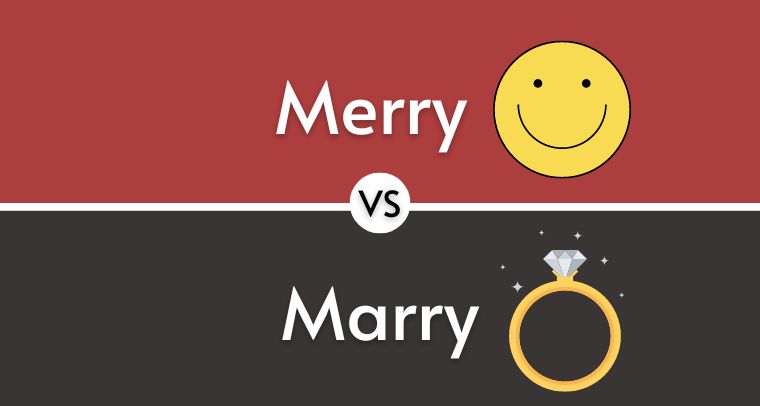Merry and Marry are two words that have different meanings and spellings. But they have the same pronunciation. Merry is an adjective that means happy and festive, while Marry is a verb that means to perform a marriage ceremony. When you are writing about the holiday season, be sure to use the adjective Merry instead of the verb Marry.
“Merry” vs. “Marry”: What’s the difference?
- The difference between the two words is simple. “Merry” means happy and can be used both as an adjective or noun (e.g., “Merry Christmas”).
- On the other hand, “Marry” means to join two people in marriage; it’s a verb that can also be used as a noun, like “marriage”. (e.g., “Will You Marry Me”).

Pronunciation of Merry and Marry
When you hear “merry,” your brain will naturally make the association between merry and marry. But if you pronounce the vowels in these two words differently, it will help you remember which one word is used. The word “marry” has a stressed first syllable (ra-y), while the word “merry” does not have a stressed first syllable (mee).
To help with this distinction, think about how each vowel sounds when it’s pronounced:
- The vowel in merry also sounds like an “eh” or short “e,” but instead of being short and clipped at the end, its length varies depending on what comes after it (if anything).
- The vowel in marry sounds like an “eh” sound or like a short “e.”
How to use Merry and Marry in a sentence
When you want to use merry in a sentence with another noun or verb—for example, if you’re writing about someone who’s feeling happy or joyful—then merry is the right choice.
- I wish you all the best & a merry Christmas.
- A merry birthday was had, with congrats to John!
- I’m especially sad, my lord, your queen’s not merry.
- Of course, a few extra merry ideas are often welcome, too.
If you want to use the word marry in a sentence with a verb, it’s usually paired with another noun (like “wife,” or “husband”).
- He wants to marry me.
- Do you honestly think I want to marry it?
- I just asked her to marry me.
- Everyone still thought she was going to marry Josh.
How to remember Merry vs. Marry
If you’re having a hard time remembering the difference between marry and merry, here’s some help:
- Merry is used as both a verb and a noun. When used as a verb, merry means “to be joyful.” When used as an adjective or adverb (that means describing words), mirthful describes something that brings joy to people or makes them happy (like when you meet your friends at happy hour).
- Marry is used as a verb. It can also be used as a noun, but in this case, it means “to enter into marriage.”
Examples: Merry vs. Marry
If you’re looking for an example of the difference between marry and merry, we can help.
The verb marry is used in the sense of getting married, while merry refers to someone happy or upbeat. It’s also sometimes used as an adjective describing someone who has a good time or likes partying. Here are some examples:
- Did you promise to marry her?
- What made you decide to marry him?
- If only some fool would marry her!
- If only some fool would marry her!
- “That party was such merry! It was so much more than just drinking beer!”
- “I can’t believe how much merry I had today!”
Merry vs. Marry: Sound very different!
If you’re wondering whether the words marry and merry sound alike, it’s probably because they are homophones. A homophone is a word that sounds like another word (or sometimes two) but has different meanings. These two words are also called near-homophones, as they share only one sound in common: “m” or “r.”
Conclusion
In conclusion, Marry means to wed; merry means happy. However, while marry usually refers to the act of getting married, merrier means something can be happier than expected—such as finding out your favorite artist won an award!
